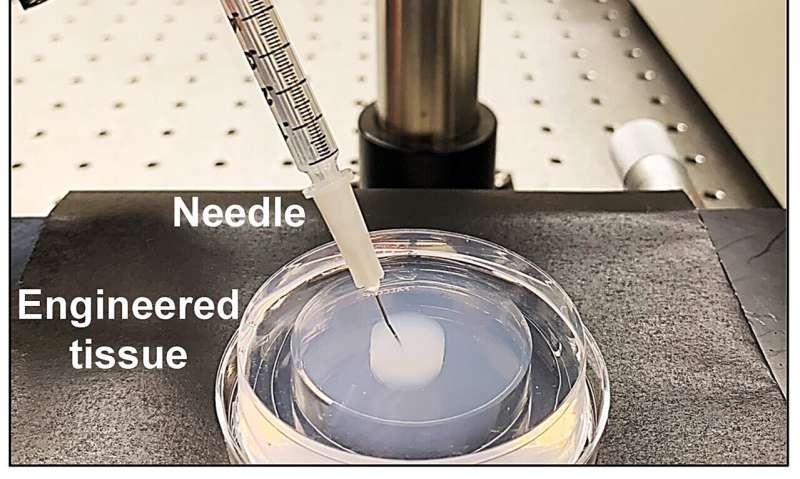A Purdue University team created a biometric platform that uses an automatic injector to push a drug into the skin model and see how it interacts with the skin tissues. The technology can help drug manufacturers create new formulations and injection devices of medications. Credit: Purdue University
Eight of the top 10 selling drugs in the United States are biologics, which are produced from living organisms or certain components of living organisms. Subcutaneous injection—where the drug is injected into the tissue layer between the skin and the muscle—is emerging as an effective delivery route alternative to intravenous infusion and allows a user to take the drug at home.
The practice has not been broadly adopted, in part due to pain and discomfort that occurs during an injection. Now, Purdue University researchers have developed technology to help drug manufacturers create new formulations and injection devices of medications to reduce the pain and discomfort.
"There is currently no reliable platform to quantify pain and discomfort induced by injections for optimizing drug formulations," said Bumsoo Han, a professor of mechanical engineering in Purdue's College of Engineering. "Patients are used to being told to measure their pain levels on a scale from one to 10. We hypothesize that the pain is related to tissue swelling during injection. Our platform enables prediction of mechanical stress and interstitial fluid pressure to optimize drug formulations with the goal of reducing pain and discomfort during subcutaneous injection."
Han and his team created a biometric platform that uses an automatic injector to push a drug into the skin model and see how it interacts with the skin tissues. The researchers then use the platform to measure stress and pressure and quantify injection-induced tissue swelling.
"We created the platform to provide new information to drug makers to help them better understand the amount of pain a certain injectable medication may cause a patient," Han said. "They can then work to design and optimize the drug formulations or injection devices to minimize the pain associated with injection."
Provided by Purdue University
























